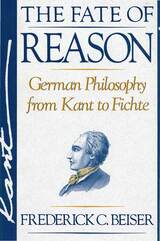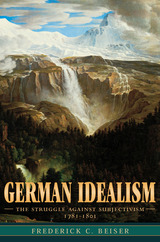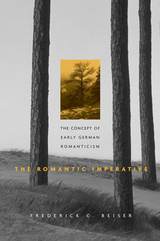
“They join the greatest boldness in thought to the most obedient character.” So Madame de Stael described German intellectuals at the close of the 18th century, and her view of this schism between the intellectual and the political has stood virtually unchallenged for 200 years. This book lays to rest Madam de Stael's legacy, the myth of the apolitical German. In a narrative history of ideas that proceeds from his book The Fate of Reason, Frederick Beiser discusses how the French Revolution, with a rationalism and an irrationalism that altered the world, transformed and politicized German philosophy and its central concern: the authority and limits of reason. In Germany, three antithetical political traditions—liberalism, conservatism, and romanticism—developed in response to the cataclysmic events in France.
Enlightenment, Revolution, and Romanticism establishes the genesis and context of these traditions and illuminates their fundamental political ideas. Moving from such well-known figures as Kant, Fichte, Jacobi, Forster, and Moser, Beiser summarizes responses to the French Revolution by the major political thinkers of the period. He investigates the sources for their political theory before the 1790s and assesses the importance of politics for their thought in general. By concentrating on a single formative decade, Beiser aims to reveal the political values and purposes underlying German thought in the late 18th century and ultimately to clarify the place of practical reason in the German philosophical tradition.

The Fate of Reason is the first general history devoted to the period between Kant and Fichte, one of the most revolutionary and fertile in modern philosophy. The philosophers of this time broke with the two central tenets of the modern Cartesian tradition: the authority of reason and the primacy of epistemology. They also witnessed the decline of the Aufklärung, the completion of Kant’s philosophy, and the beginnings of post-Kantian idealism.
Thanks to Frederick C. Beiser we can newly appreciate the influence of Kant’s critics on the development of his philosophy. Beiser brings the controversies, and the personalities who engaged in them, to life and tells a story that has uncanny parallels with the debates of the present.


The Early Romantics met resistance from artists and academics alike in part because they defied the conventional wisdom that philosophy and the arts must be kept separate. Indeed, as the literary component of Romanticism has been studied and celebrated in recent years, its philosophical aspect has receded from view. This book, by one of the most respected scholars of the Romantic era, offers an explanation of Romanticism that not only restores but enhances understanding of the movement's origins, development, aims, and accomplishments--and of its continuing relevance.
Poetry is in fact the general ideal of the Romantics, Frederick Beiser tells us, but only if poetry is understood not just narrowly as poems but more broadly as things made by humans. Seen in this way, poetry becomes a revolutionary ideal that demanded--and still demands--that we transform not only literature and criticism but all the arts and sciences, that we break down the barriers between art and life, so that the world itself becomes "romanticized." Romanticism, in the view Beiser opens to us, does not conform to the contemporary division of labor in our universities and colleges; it requires a multifaceted approach of just the sort outlined in this book.
READERS
Browse our collection.
PUBLISHERS
See BiblioVault's publisher services.
STUDENT SERVICES
Files for college accessibility offices.
UChicago Accessibility Resources
home | accessibility | search | about | contact us
BiblioVault ® 2001 - 2024
The University of Chicago Press









